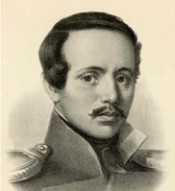
Birth of Russian poet and prose writer Mikhail Yurievich Lermontov
Russian poet and novelist Mikhail Lermontov, a successor of A. S. Pushkin and a continuer of the best traditions of Russian literature, influencer on literature, painting, music, and theater, was born on October 3 (15), 1814, in Moscow, into a noble family.
Maternally, Mikhail was descended from a wealthy noble family of Stolypin. The poet's father - a retired captain Yuri Petrovich Lermontov, was from the family of poor landowners in Tula province. Being very young, Mikhail lost his mother and was brought up and educated by his grandmother E. A. Arsenyeva. The boy grew up in Penza province, in his grandmother’s estate Tarkhany.
In 1828, Lermontov was sent to the boarding school at the University of Moscow, where he became actively involved in literature, published a handwritten journal "Dawn", which published his first poem, "Indian woman." In 1828-1829, Lermontov wrote "Le Corsaire", "Criminal", "Oleg", "Two Brothers" (published posthumously), "The Last Son of Liberty", "Ismail Bey", "Demon." When the boarding school was converted into a gymnasium in 1830, Lermontov left it and entered the Moscow University, Moral and Political Department. In the university Mikhail studied together with V. G. Belinsky, A. I. Herzen, N. P. Ogarev. At the time Lermontov wrote his lyrical cycle of poems ("To Sushkova", "Beggar", "Stanzas," "Night," "Imitation of Byron," "I do not love you: passion..."). After 1832, Lermontov refers to the ballad ("Reed", "Desire", "Open a prison for me", "Mermaid") and to the prose.
In 1832, Lermontov left the university because of a conflict with the professors and entered the School of guard sub-ensigns and cavalry cadets in St. Petersburg, which he graduated from in 1834 in a rank of cornet of the Life Guards Hussar Regiment.
One of the first of Lermontov's works, which appeared in the press, was the poem "Haji Abrek” published in 1835 in the journal "Library for Reading" without the knowledge of the author. In the period of 1836-1837, Lermontov wrote the first original and mature poem "Boyar Orsha," worked on the novel "Vadim" (not finished), "The Princess Ligovskaya" (not finished) and the drama "Masquerade". In 1837, the journal "Contemporary" published his poem "Borodino" written in honor of the Battle of Borodino of September 1812.
Lermontov wrote the "Death of a Poet" in commemoration of the death of Pushkin. The poem was quite negatively perceived at court, for which Mikhail was sent to the army in the Caucasus. Being in exile he wrote watercolors, oil paintings, drawings, landscapes, genre scenes, portraits and caricatures. In July of 1837, after the hassle of his grandmother, Lermontov was transferred to the Grodno Hussars Regiment, and then returned to the Life Guards Hussar Regiment in St. Petersburg.
Back in the capital, Lermontov met V. A. Zhukovsky, P. A. Viazemsky, P. A. Pletnev, V. A. Sollogub, the family of Karamzins; his works were published by the "Notes of the Fatherland." It was in that magazine where most of Lermontov’s lifetime and posthumous publications appeared. In 1840, the famous novel of Mikhail Yurievich "Hero of Our Time" was published. The same year, a romantic poem "The Novice" was published in the collected works "Poems of M. Lermontov."
In February 1840, after a quarrel between Lermontov and the son of a French envoy Barant at the ball organized by Countess Laval, they had a duel and then Mikhail was transferred to Tenghinka infantry regiment in the acting army in the Caucasus. In fighting the poet showed outstanding bravery; as a member of a heavy battle at the river Valerik in Chechnya, he had twice been recommended for a decoration. In January 1841, being given a two-month vacation, Lermontov left for St. Petersburg, where he moved in literary and social circles. At the end of the holiday, in March, he attempted to resign in order to devote himself to literary work, but was refused and 14 (26) April 1841 went back to the Caucasus.
In May, Mikhail arrived in Pyatigorsk and was authorized to stay for the treatment at mineral waters. There he wrote a number of poems such as: "Dream", "Rock", "They loved each other...", "Tamara", "Rendezvous", "Leaf", "Alone on the road...", "Marine princess," "The Prophet" and others. A quarrel at one of the soirees with his ex-classmate in the cadet school, retired Major N. S. Martynov led to a duel that ended with the death of the poet 15 (27) July 1841.
Mikhail Lermontov was buried in the town cemetery in Pyatigorsk, 17 (29) July 1841. Later, the poet's coffin was transported to the village Tarkhany, where it was buried in the family crypt of Arsenyevs on April 23 (May 5), 1842.
Lit.: Основная литература о жизни и творчестве М. Ю. Лермонтова [Электронный ресурс] // ФЭБ «Русская литература и фольклор». 2002. URL: http://feb-web.ru/feb/lermenc/lre/Lre-655-.htm?cmd=2.
Based on the Presidential Library’s materials:

